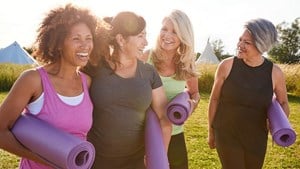Six ways to stay strong, active and mobile in later life
2 minute read

Regular activity helps keep the heart, body and brain healthy. Here are six ideas to help you stay strong, active and mobile in later life.

Independent Living Solutions
Home mobility aids, wearable alarms and personal care products to help you live independently, stay safe and feel confident.
In August 2022, Scottish bowling champ Rosemary Lenton bagged a Commonwealth Games gold medal at the age of 72. She says she took up the sport as a way to regain her independence and make friends. While a gold medal might be aiming high, there are plenty of other ways to stay strong, active and mobile in later life. Many GPs now prescribe exercises like walking and cycling to help people stay healthier. Here are six ideas for building and maintaining physical and mental fitness.
1. Walk the world to fitness and friendship
Walking is a great way to reduce the risk of heart disease and maintain a healthy weight. It also strengthens bones and muscles. For added interest or motivation, there are a host of different fitness and walking apps for mobile phones.
One example is World Walking which helps people learn about the world while staying fit. The app tracks distances walked and converts that to “virtual” walks in some of the most beautiful places on Earth. So, a stroll around the local park can become a virtual walk along the Great Wall of China, over San Francisco’s Golden Gate Bridge or up to Machu Picchu.
World Walking also connects users so they can make friends online including other people in their area.
2. How the library can help
For those who prefer to stay closer to home, libraries and leisure and community centres will often have details of local walking groups with leaflets at the front desk.
You can still track your progress with a fitness tracker or smartwatch. The Age Co Personal Alarm Watch includes a pedometer to count daily steps as well as ensuring help is only a touch of a button away in the case of an emergency, so you can exercise with confidence.
3. Stay strong with gentle sitting exercises
One of the simplest and safest ways to stay active at home is through chair-based arm and leg exercises. Just a small amount every day can make a real difference to overall strength and wellbeing.
Age UK has a set of exercise videos to follow at home and the NHS offers a good range of sitting exercises too. As with any exercise, the advice is to gently warm up before and cool down afterwards.
4. Get moving with tried-and-tested physio apps
There are several apps that can help with controlling pain through tried-and-tested exercises to keep people moving. The NHS MSK Help app has exercises and video clips to help get people moving safely, as well as fun quizzes and reminders.
When it comes to joint pain or stiffness it’s always a good idea to speak to a doctor so that they can provide a proper assessment, recommend treatments, or arrange for any specialist support such as physiotherapy sessions.
5. Workouts for everyone
Joe Wicks (AKA the Body Coach) became famous for his lockdown exercise videos for everyone from kids to retirees. Presented in a quickfire style, his high energy exercise videos can be fun for the whole family, especially those looking for a challenge.
For something more geared to older adults, Nuffield Health’s seven exercises can boost coordination, confidence and emotional wellbeing.
In-person exercise classes including dance, tai chi and pilates are also offered by some Age UK centres across the country.
With any activity, it’s worth taking medical advice before starting and, above all, be sure that any exercise area is free from trip hazards.
6. Yoga and meditation for beginners
Evidence shows that regular yoga can help with high blood pressure, heart disease and even blood sugar levels.
The NHS offers pre-recorded beginners’ yoga and pilates video exercises, along with safety instructions.
Meditation and mindfulness have also been shown to help with mental wellbeing. They help us to notice signs of stress and focus on feelings in a calm way. Age UK has some helpful meditation exercises.
Whatever your age, mobility or current level of fitness there are lots of options to help keep you active and feeling your best, and it's never too late to make changes to improve your mental and physical health.

Sign up to the Age Co Newsletter
Each month, our email newsletter delivers inspiring stories, practical guides to later life, plus the latest news about Age Co and the charitable work we support.
